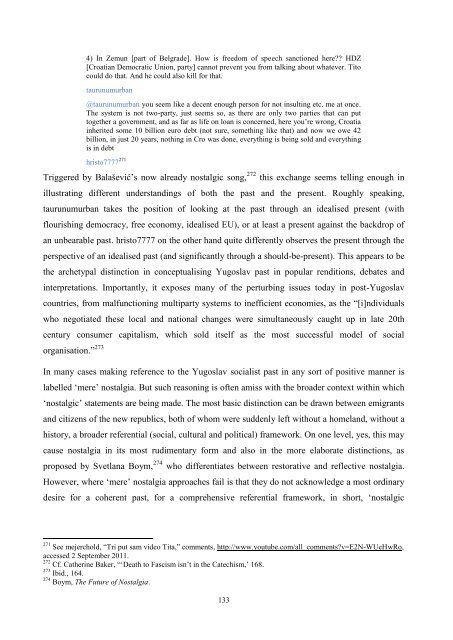UNIVERSITY OF NOVA GORICA GRADUATE SCHOOL ...
UNIVERSITY OF NOVA GORICA GRADUATE SCHOOL ...
UNIVERSITY OF NOVA GORICA GRADUATE SCHOOL ...
Create successful ePaper yourself
Turn your PDF publications into a flip-book with our unique Google optimized e-Paper software.
4) In Zemun [part of Belgrade]. How is freedom of speech sanctioned here?? HDZ<br />
[Croatian Democratic Union, party] cannot prevent you from talking about whatever. Tito<br />
could do that. And he could also kill for that.<br />
taurunumurban<br />
@taurunumurban you seem like a decent enough person for not insulting etc. me at once.<br />
The system is not two-party, just seems so, as there are only two parties that can put<br />
together a government, and as far as life on loan is concerned, here you‘re wrong, Croatia<br />
inherited some 10 billion euro debt (not sure, something like that) and now we owe 42<br />
billion, in just 20 years, nothing in Cro was done, everything is being sold and everything<br />
is in debt<br />
hristo7777 271<br />
Triggered by Balašević‘s now already nostalgic song, 272 this exchange seems telling enough in<br />
illustrating different understandings of both the past and the present. Roughly speaking,<br />
taurunumurban takes the position of looking at the past through an idealised present (with<br />
flourishing democracy, free economy, idealised EU), or at least a present against the backdrop of<br />
an unbearable past. hristo7777 on the other hand quite differently observes the present through the<br />
perspective of an idealised past (and significantly through a should-be-present). This appears to be<br />
the archetypal distinction in conceptualising Yugoslav past in popular renditions, debates and<br />
interpretations. Importantly, it exposes many of the perturbing issues today in post-Yugoslav<br />
countries, from malfunctioning multiparty systems to inefficient economies, as the ―[i]ndividuals<br />
who negotiated these local and national changes were simultaneously caught up in late 20th<br />
century consumer capitalism, which sold itself as the most successful model of social<br />
organisation.‖ 273<br />
In many cases making reference to the Yugoslav socialist past in any sort of positive manner is<br />
labelled ‗mere‘ nostalgia. But such reasoning is often amiss with the broader context within which<br />
‗nostalgic‘ statements are being made. The most basic distinction can be drawn between emigrants<br />
and citizens of the new republics, both of whom were suddenly left without a homeland, without a<br />
history, a broader referential (social, cultural and political) framework. On one level, yes, this may<br />
cause nostalgia in its most rudimentary form and also in the more elaborate distinctions, as<br />
proposed by Svetlana Boym, 274 who differentiates between restorative and reflective nostalgia.<br />
However, where ‗mere‘ nostalgia approaches fail is that they do not acknowledge a most ordinary<br />
desire for a coherent past, for a comprehensive referential framework, in short, ‗nostalgic<br />
271 See mejerchold, ―Tri put sam video Tita,‖ comments, http://www.youtube.com/all_comments?v=E2N-WUeHwRo,<br />
accessed 2 September 2011.<br />
272 Cf. Catherine Baker, ―‗Death to Fascism isn‘t in the Catechism,‘ 168.<br />
273 Ibid., 164.<br />
274 Boym, The Future of Nostalgia.<br />
133

















